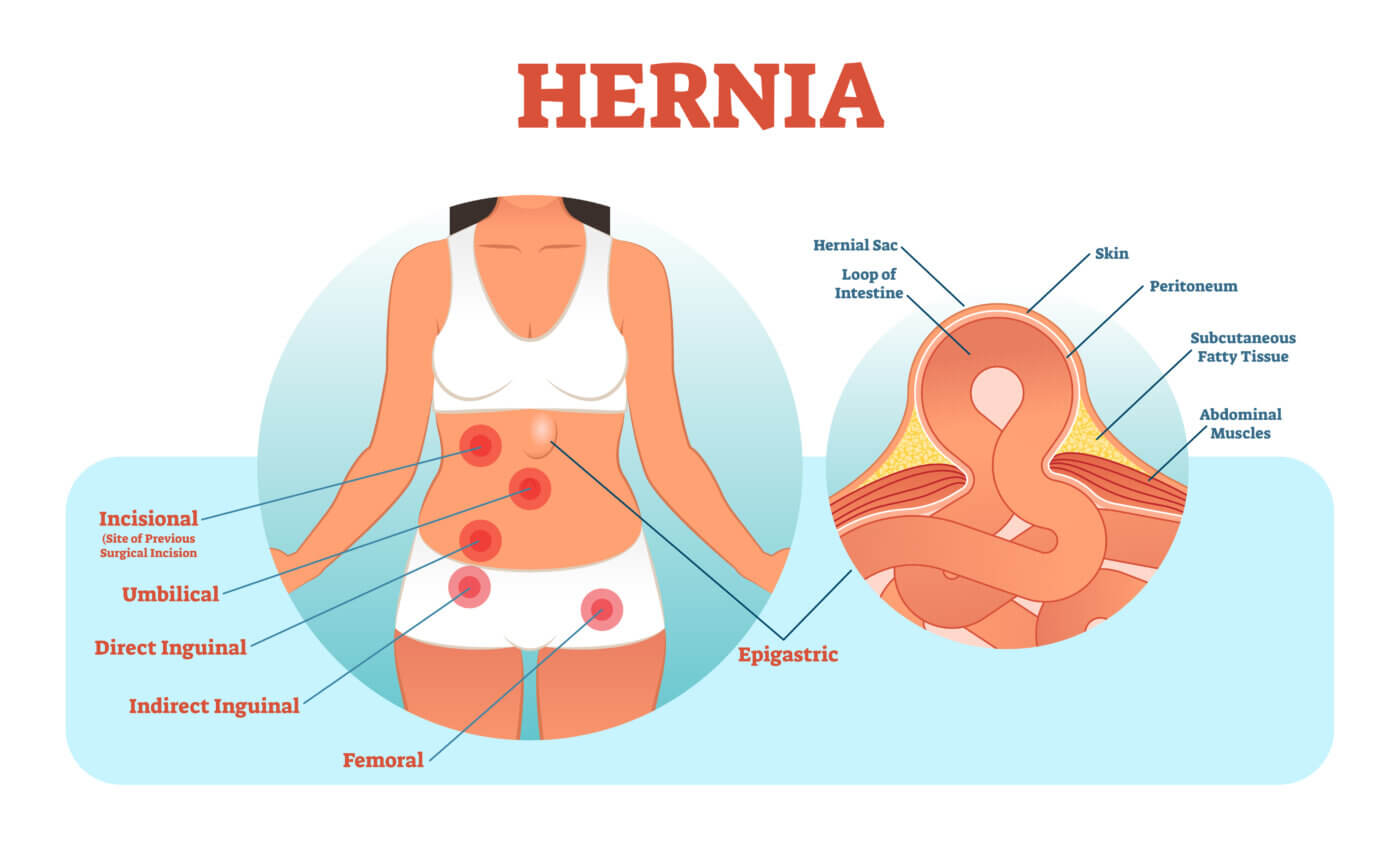Inguinal Hernia during Pregnancy-What you should know!

Inguinal Hernia during Pregnancy- What is it, how to treat, what you should know!
Caroline Christensen, M.Ed and Andie Davis, November 19, 2021
Many women know the discomfort of a hernia, especially during pregnancy. However, the Inguinal Hernia (a.k.a. The Groin Hernia) is a hernia most commonly experienced by males. Even though men are much more likely to experience an Inguinal Hernia, it is also possible to occur in women, particularly during pregnancy and birth. Please do not be alarmed! Inguinal hernias are relatively uncommon and only 0.1% of women experience inguinal hernias during pregnancy. (1) A hernia does not put your growing baby at risk. Because the fetus is growing in your uterus, it is not connected to the inguinal hernia area in your groin. Most women with inguinal hernias have a normal vaginal birth, however, with larger hernias you may be recommended to have a cesarean section birth.
What is an Inguinal Hernia?
Any hernia can occur due to a weakness in connective tissue or muscle that normally holds your organs and fatty tissue in place. When an area of muscle or connective tissue weakens it allows organs or fatty tissue to push or protrude through creating a soft, often achy lump. When you are pregnant and your belly is growing, your abdominal wall stretches and can lead to weakness in certain areas where a hernia can occur.
Although hernia defects (that do not become noticeable until pregnancy) are present from birth-they are hereditary, there are certain risk factors that can make women more susceptible to an Inguinal Hernia. These factors include having had a prior hernia, being pregnant with multiple babies at once, obesity, or a prior pregnancy with a long labor.
When you experience an Inguinal Hernia, your intestines are protruding through the lower abdominal wall, also known as the inguinal canal which is in your groin area. In women, the inguinal canal holds your uterus. This type of hernia usually happens due to uterine pressure as your baby grows and your belly expands.
What are the symptoms of an Inguinal Hernia?
Most commonly symptoms of groin pain occur during the second trimester of pregnancy.
The main symptom of an Inguinal Hernia are:
- a soft lump or protrusion in your groin area.
- a dull ache in the area of the lump or groin area
- increased pain during physical activity, sneezing, coughing, lifting and/or bending over
- difficulty lifting the leg on the side of the affected area
- relief of symptoms while lying on the opposite side of the groin pain
If your hernia is giving you severe pain and continuously sticks out more and more, you should call your doctor. In the case that you are experiencing nausea, vomiting, redness and tenderness from the pain of the hernia, it is important to go to the Emergency Room to ensure you do not damage your intestines. This is rarely the case, but it is important to prevent it.
How is an inguinal hernia diagnosed?
It is important to go to your doctor for a proper diagnosis of pain or lump you are experiencing. Often a lump in the groin area is misdiagnosed as an inguinal hernias but is actually a round ligament varicosity.(3,4) Having a Doppler Ultrasound, which shows blood flow is an important factor in diagnosing a hernia vs varicosity and will assist in accurately diagnose your symptoms. (3,4) Often both of these issues will subside after pregnancy, however, if it is a larger hernia it is recommended to talk to a hernia specialist about repair.
How to reduce pain and treat an Inguinal Hernia during pregnancy?
If you have an Inguinal Hernia, it is recommended that you:
- Most often doctors recommend the ‘wait and see’ protocol where surgery is not recommended during pregnancy and because hernias often do not persist beyond pregnancy they ‘wait and see’ what the hernia will look like after you give birth
- Take caution lifting heavy objects: ask for help to lift – if this is not possible think outside the box, can you put the object in a cart to wheel it into the house (ie groceries), can you bend down to comfort a child instead of lifting?
- Sleep on your back or the opposite side of the affected area
- Avoid intense exercise, movement or lifting, and wear the Inguinal Hernia Support Belt Kit during any such movement to hold in the hernia. With award winning groin bands that can fasten onto a belly band, they provide unparalleled support for pelvic pain, pressure and heaviness. Our unique hernia compression squares also add increased support wherever you may need it. They are easy to adjust, soft, and comfortable on a sensitive Inguinal Hernia. The compression groin bands are also effective on varicose veins.
- Use a cold therapy pack to relieve pain and reduce swelling and to massage the hernia back into the groin area. The Ultra Soft Hot and Cold Therapy Packs from BabyBellyBand are recommended, as they contain a gel that allows a soft and comfortable massaging process for the hernia where there may be pain or swelling.
Sources:
- Do Kyung Lee, Sung Woo Bae,1 Hwasook Moon,2 and Yoo Kyung Kim3 ,2011 Jun; 80(6): 437–439.Round ligament varices mimicking inguinal hernia in pregnancy https://www.ncbi.nlm.nih.gov/pmc/articles/PMC3204688/ J Korean Surg Soc. Published online 2011 Jun 9. doi: 10.4174/jkss.2011.80.6.437
- DerSarkissian, MD Carol, July 28, 2021, Understanding Hernia-The Basics, WebMD, Retrived https://www.webmd.com/digestive-disorders/understanding-hernia-basics
- H Yonggang 1, Y Jing 2, W Ping 1, G Guodong 1, M Chenxia 3, X Xiaojing 3, Z Fangjie 1, W Hao 1, 2017 Dec;21., Forty-one cases of round ligament varicosities that are easily misdiagnosed as inguinal hernias (6):901-904. doi: 10.1007/s10029-017-1670-3. Epub 2017 Oct 3. https://pubmed.ncbi.nlm.nih.gov/28975424/
- M Lechner 1, R Fortelny, D Ofner, F Mayer, 2014 Jun;18, Suspected Inguinal hernias in pregnancy-handle with care! (3):375-9. doi: 10.1007/s10029-013-1082-y. Epub 2013 Apr 5. https://pubmed.ncbi.nlm.nih.gov/23559310/
- Everything You Want to Know about a Hernia https://www.healthline.com/health/hernia Last medically reviewed on November 16, 2021
- Ott, Lauren PA-C, April 11, 2019 Hernia and Pregnancy, What to Expect if Your Expecting, April 11, 2019 https://bostonhernia.com/does-pregnancy-cause-hernias/


